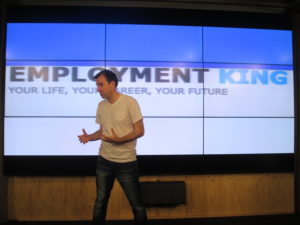To Pass an Interview Train As a Public Speaker
In the job interview book “the 73 rules for influencing the interview” I talked and taught you how to increase your communication confidence and how to influence the interviewer using words.
This mixture of persuading with confident communication is the desired skill that increases your chance of being offered a position. This skill can be developed through public speaking.
How many times have you been influenced or moved by a powerful orator? How has a charismatic speaker motivated you? How did confident communication get you to change your opinion?
Being able to persuade with words is the desired skill of any interviewee. These same techniques are being used right now by public speakers.
Set Up Your Own Coaching Business

Talk With Purpose
When learning to public speak one of the first lessons you learn is to talk with purpose.
This is a lesson you need to take with you to the job interview. One of the biggest interview killers is the way an interviewee communicates. Often, due to nervousness, the interviewee talks without thought, they drone on and on about everything apart from the answer to the asked question.
When asked an interview question, first think to yourself “what skill, quality or experience do they want me to discuss with this interview question?” Remember to think back to the job spec
All job interview questions, even curved ball job interview questions, are asked to uncover specific desired criteria. By focusing in on these criteria you can speak with purpose, keeping your interview answer on point.
Create a Strong Structure
It is easy to get lost in your own interview answer.
Have you ever found yourself asking the interviewer if you have answered their question? This is because we answer interview questions with no structure.
In public speaking you are taught to 1; state what you are going to say 2; say what you are going to say 3; summaries what you said
This is a great structure for getting your point across and keeping your interview answer short and on point. In the job interview, you can adopt this same (or a similar version) structure. Start by 1; saying you have desired criteria 2; give an example of desired criteria 3; summaries by stating that these criteria are your key strength
FREE With Every Purchase of The 73 Rules for Influencing the Interview
Use more than Just Words
Great public speakers inspire, motivate and enthuse the audience not just with words, but also with their tone, body language, gestures, stage presence, stories, metaphors, rhetorical devices, facial expressions and the use of props (maybe a PowerPoint presentation)
Confident interviewees use these same well-tuned skills (that you can easily learn from an interview coach or by attending a public speaking group) A remember-able interviewee, the one who is offered the job, creates an emotional connection with the interviewer by communicating with all their senses, creating intrigue and using public speaking persuasion techniques.


